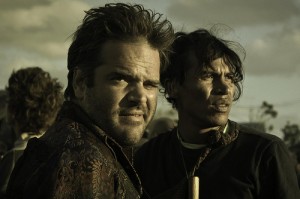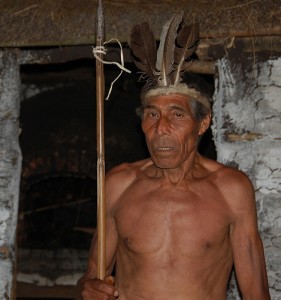For the first time in Uruguay, the country commemorated the “Day of the Charrúa Nation and the Indigenous Identity.” April 11, 2010, marked 179 years of what some Uruguayans call a massacre, and others a genocide of the Charrúa people in Salisipuedes [es] (“Salisipuedes” translated to English means “get out if you can”). During the carnage which took place on April 11, 1831, 40 Charrúas were killed and 300 taken as prisoners; it was the first president of Uruguay, Fructuoso Rivera, who perpetrated the ordeal, as the blog Nordeste Montevideo [es] explains. The post goes on to detail the aftermath of the massacre:
Los prisioneros son trasladados a Montevideo en condiciones infrahumanas; los hacen caminar días y días hasta la capital. Los hombres encarcelados, vendidos o muertos después del cautiverio; mujeres y niños entregados como servidores a las familias patricias de Montevideo

Photo representing a colonizer and a Charrúa. Uploaded by Flickr user aramolara, and used under a Creative Commons license
The law that made this day of remembrance a reality was passed last year, and as Mario Delgado Gerez from La República [es] explains, it recognizes the fight of the Charrúas against the imperial powers that tried to conquer the land Uruguayans now call home:
La aprobación de la flamante Ley que declara al 11 de abril de cada año “Día de la Nación Charrúa y la identidad indígena” se convierte además de un reconocimiento histórico a los hechos sucedidos en 1831, en un acto de justicia póstuma para los que generosamente ofrecieron su vida por nuestra tierra, libertad y dignidad en una resistencia de más de 300 años contra los imperios invasores de la época.
The blog Abrecabezas [es] posted the aforementioned article from La República and received some comments regarding this new law.
One of the comments came from a user from the blog Nuevo Espacio en Lavalleja [es]:
Me alegro enormemente que se haya recoonocido ofialmente ese genocidio, para cambiar realmente debemos saber qué es lo que hay que cambiar; y sin duda alguna, tener presente estas barbaridades, nos ayuda en ese sentido.
On the Facebook page Nación Charrúa [es] (Charrúa Nation) Dana Nunñez, among others, commented on the issue:
Los cambios si no nacen de cada uno de los Uruguayos y Uruguayas no vale la pena ser impuestos. Creo que es parte de la dignidad CHARRUA tener lo que se les ha negado pero por derecho y esto tenemos que reconocerlo. Son nuestras RAICES y es el único legado que hay que defender.
Some Charrúas still live in Uruguay. They try to maintain their traditions amidst a country they criticize for not only killing them, but also for forgetting them.
A Charrúa family tells their story of facing discrimination for something as simple as registering the names for their two sons. This Charrúa family submitted an indigenous name for their son -Itanú, which means “rock heartbeat”– for his birth records, but the official rejected the name saying that it failed to show the gender of the baby. They left the registration office with a warning that if they didn’t register their son in 10 days, a name would be selected at random for him.
In a letter published by the blog El Muerto [es], the family speaks of the discrimination they face as Charrúas living in a country that they feel has forsaken them:
En el Uruguay en que vivimos actualmente, late la discriminación y la xenofobia. Pero aún es más increíble y no deja de asombrar la desmemoria. Porque olvidamos todo muy fácilmente, pues así como olvidamos horrores y terrores de nuestra historia más reciente olvidamos injusticias más antiguas. Olvidamos que el mismo estado uruguayo en su estado fundacional comete el primer acto de terrorismo de Estado, comete genocidio para con el Pueblo Charrúa, comete etnocidio, linguicidio y culturicidio.
The letter is signed by “Itanú, Yrupé, Jasymimbí, Evelyn y Tacuabé.
Comunidad Charrúa Basqüadé Inchalá” (Charrúa Community Basqüadé Inchalá).
Susana Andrade wrote an opinion piece in the digital newspaper Diario Uruguay [es], remembering the genocide and tying it to the story of Itanú. Echoing what others have said on the Nación Charrúa Facebook page, she explains that even if the law were to change and allow parents to name their child as they pleased, there needs to be a more profound change in the minds and feelings of the general population:
Al parecer se buscaría modificar la ley que deja a la valoración -subjetiva inevitablemente- del funcionario de turno, si los nombres propuestos por los responsables del niño o niña que se va a anotar, son “correctos o incorrectos”. De todas formas y para mal, el sentimiento racista no ha cambiado mucho en los corazones y en las mentes de cierta parte de la población. En tanto esto no suceda, es al cuete legislar si no nace el respeto desde la barriga.
Apparently it is being sought to modify the law so that it would leave up to judgment –subjective inevitably— of the official on duty, if the names proposed by the adults responsible for the boy or girl that is being registered, are “correct or incorrect.” In any case and in a bad way, the racist sentiment hasn’t changed much in the hearts and minds of a certain part of the population. Until this change doesn’t happen, it is useless to legislate if the change is not born from the inside.
The term “Charrúa” is widely used as a nickname for the national soccer team, and the saying “garra charrúa” is used to denote braveness, strength and persistence; but to many, their knowledge about this indigenous community does not go further than what these popular names refer to. Without a doubt, this new holiday will raise awareness and educate Uruguayans about the Charrúa indigenous community and the heritage they represent to the country. Uruguayans concerned about the Charrúa and those who support the new law commemorating April 11 as the “Day of the Charrúa Nation and the Indigenous Identity” think this law is a small but significant step; to them, complete success will only be achieved once every Uruguayan proudly accepts and embraces their indigenous heritage.








3 comments
I’m a bit confused…I think it’s a great idea that they are going to commemorate their country’s history by honoring the indigenous people, however everywhere I look up information on Uruguay it states that the native population was killed off sometime in the mid 1850’s. Who were the ones trying to give their baby an indigenous name?
There are still descendants with mixed blood, there are still descendants in the northern parts of Uruguay/Paraguay
I am one